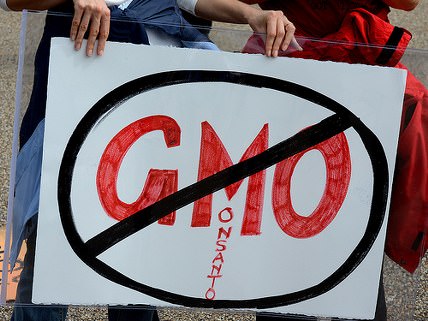Challenge Highlights Flaws in Hawaii's Anti-GMO Law
A judge on Hawaii's Big Island last week halted enforcement of part of Hawaii's flawed anti-GMO law.
by Baylen Linnekin, Reason Magazine, March 15, 2014
 Stephen D. Melkisethian Foter.com
Stephen D. Melkisethian Foter.com
Last week a Hawaii state judge issued an injunction halting enforcement of a key component of a new anti-GMO law. The judge ruled after a farmer sued the county government of the eponymous "Big Island" of Hawaii, seeking to halt enforcement of the legislation.
The law, passed late last year, bans growing and field testing of nearly all GMO crops. The anonymous papaya farmer argues that the law "sharply conflicts with federal and state law."
While the Hawaii ordinance exempts GMO papaya farmers—because, well, papayas!—it requires them to register annually at a cost of $100 for every farmed location,explains Hawaii land use attorney Robert Thomas.
The anonymous farmer opposes providing such information and fears that his information could be made public. He's got good reason to be fearful. As Reason's Ron Bailey writes in the February 2014 print edition, anti-GMO activists "macheted down" 100 GMO papaya trees this past fall.
Far-off Hawaii may seem like an odd focal point for a debate about planting GMO crops. After all—like many islands—the state imports more than 85 percent of its food.
But it's got a proud agricultural tradition—and one in recent decades that has centered, in part, on GMO crops.
"Hawaii was the site of one of the first great successes of crop biotechnology," writes Bailey. "In the 1990s, the Hawaiian papaya industry was saved by the creation of a genetically enhanced variety modified to resist the ringspot virus that was then devastating growers."
Even the authors of the county GMO ban acknowledge the important role GMOs played in saving Hawaii's papayas, writing in the bill itself that GMO "testing of this one crop over the past decade [w]as the means of choice to address certain papaya diseases."
Given these tensions inherent in the ban, it's not surprising to find similar strains exist on a greater scale throughout Hawaii.
"Underlying the debate about GMOs in Hawaii is, I suspect, a tension between those who have lived in the islands for generations and newcomers from the mainland," says historian Rachel Laudan, author of both The Food of Paradise: Exploring Hawaii's Culinary Heritage and the new Cuisine and Empire, in an email to me.
"For the locals, the islands have always been a place of high tech agriculture," writes Laudan. "Many of them worked on the big sugar and pineapple plantations. They saved to buy small plots of land. Those who farm these plots know that the papaya growers have survived thanks to genetically modified varieties that have been safely used since the 1990s."
In an excellent article earlier this year that detailed the path to passage for the anti-GMO law in Hawaii, New York Times reporter Amy Harmon referred to the GMO debate as "a subject in which popular beliefs often do not reflect scientific evidence."
That's a particular problem because laws like Hawaii's are spreading.
"This is a national movement," said Hawaii attorney general David Louie recently. "Don’t think that it’s not coming to you."
Science need not drive law and policy. I prefer fewer laws and policies, and would prefer that individual freedom be the first concern of any lawmaker. But if we must have laws and policies—particularly those impacting science—then they must be driven by science.
I defend the right of any farmer or consumer who would rather die than grow or eat GMO foods to avoid them at all costs. I've defended that right often (see here, here, and here, for example). But I defend equally the rights of the farmers who want to grow GMO crops and the consumers who want to eat them (or who are indifferent). Hawaii's anti-GMO law is dead wrong because it favors the rights of one set of people over those of another. Whatever your stance on GMOs, that's a policy worthy of zealous opposition.
---30---
Baylen J. Linnekin, a lawyer, is executive director of Keep Food Legal, a Washington, D.C. nonprofit that advocates in favor of food freedom—the right to grow, raise, produce, buy, sell, share, cook, eat, and drink the foods of our own choosing.
Follow Baylen Linnekin on Twitter
Find Baylen Linnekin on Facebook